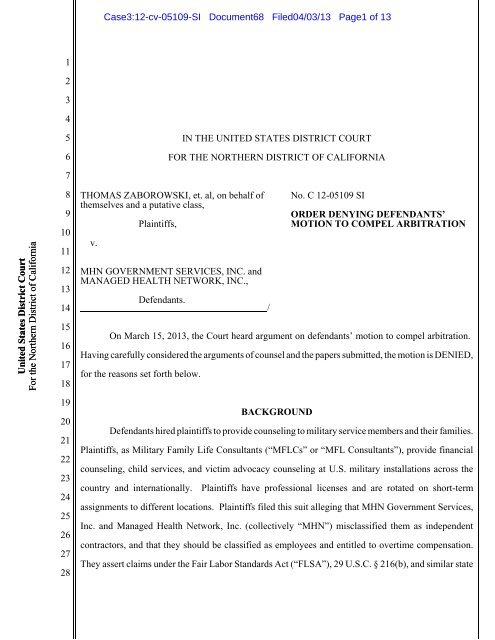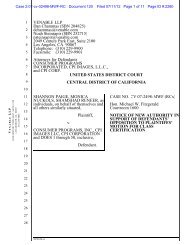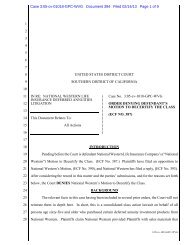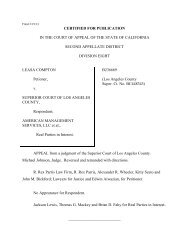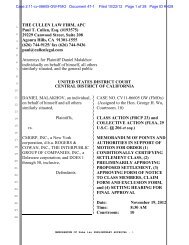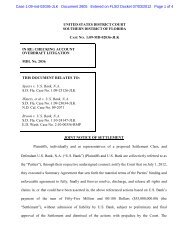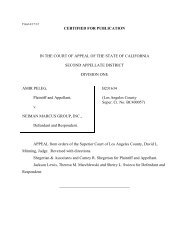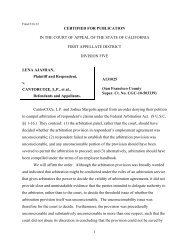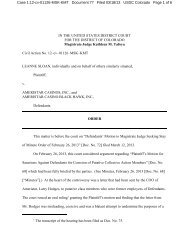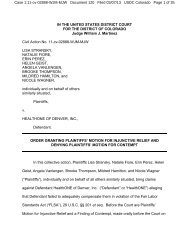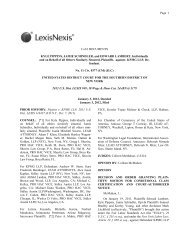order denying motion to compel arbitration - Impact Litigation Journal
order denying motion to compel arbitration - Impact Litigation Journal
order denying motion to compel arbitration - Impact Litigation Journal
You also want an ePaper? Increase the reach of your titles
YUMPU automatically turns print PDFs into web optimized ePapers that Google loves.
Case3:12-cv-05109-SI Document68 Filed04/03/13 Page1 of 13<br />
1<br />
2<br />
3<br />
4<br />
5<br />
6<br />
7<br />
IN THE UNITED STATES DISTRICT COURT<br />
FOR THE NORTHERN DISTRICT OF CALIFORNIA<br />
United States District Court<br />
For the Northern District of California<br />
8<br />
9<br />
10<br />
11<br />
12<br />
13<br />
14<br />
15<br />
16<br />
17<br />
18<br />
THOMAS ZABOROWSKI, et. al, on behalf of<br />
themselves and a putative class,<br />
v.<br />
Plaintiffs,<br />
MHN GOVERNMENT SERVICES, INC. and<br />
MANAGED HEALTH NETWORK, INC.,<br />
Defendants.<br />
/<br />
No. C 12-05109 SI<br />
ORDER DENYING DEFENDANTS’<br />
MOTION TO COMPEL ARBITRATION<br />
On March 15, 2013, the Court heard argument on defendants’ <strong>motion</strong> <strong>to</strong> <strong>compel</strong> <strong>arbitration</strong>.<br />
Having carefully considered the arguments of counsel and the papers submitted, the <strong>motion</strong> is DENIED,<br />
for the reasons set forth below.<br />
19<br />
20<br />
21<br />
22<br />
23<br />
24<br />
25<br />
26<br />
27<br />
28<br />
BACKGROUND<br />
Defendants hired plaintiffs <strong>to</strong> provide counseling <strong>to</strong> military service members and their families.<br />
Plaintiffs, as Military Family Life Consultants (“MFLCs” or “MFL Consultants”), provide financial<br />
counseling, child services, and victim advocacy counseling at U.S. military installations across the<br />
country and internationally. Plaintiffs have professional licenses and are rotated on short-term<br />
assignments <strong>to</strong> different locations. Plaintiffs filed this suit alleging that MHN Government Services,<br />
Inc. and Managed Health Network, Inc. (collectively “MHN”) misclassified them as independent<br />
contrac<strong>to</strong>rs, and that they should be classified as employees and entitled <strong>to</strong> overtime compensation.<br />
They assert claims under the Fair Labor Standards Act (“FLSA”), 29 U.S.C. § 216(b), and similar state
Case3:12-cv-05109-SI Document68 Filed04/03/13 Page2 of 13<br />
1<br />
2<br />
3<br />
4<br />
labor laws.<br />
The standard counseling services contract between MHN and an MFL Consultant is called a<br />
Provider Services Task Order Agreement (“Agreement”). The Agreement contains an express<br />
manda<strong>to</strong>ry <strong>arbitration</strong> clause. The <strong>arbitration</strong> clause states in pertinent part:<br />
United States District Court<br />
For the Northern District of California<br />
5<br />
6<br />
7<br />
8<br />
9<br />
10<br />
11<br />
12<br />
13<br />
14<br />
15<br />
16<br />
17<br />
18<br />
The parties agree that any controversy or claim arising out of or relating <strong>to</strong> this<br />
Agreement . . . or the breach thereof, whether involving a claim in <strong>to</strong>rt, contract or<br />
otherwise, shall be settled by final and binding <strong>arbitration</strong> in accordance with the<br />
provisions of the American Arbitration Association. The parties waive their right <strong>to</strong> a<br />
jury or court trial.<br />
First Amended Complaint (“FAC”), Ex. A 20. Some of the procedural rules set forth in the Agreement<br />
include: the provisions of the American Arbitration Association (“AAA”) govern; the <strong>arbitration</strong> shall<br />
be conducted in San Francisco, California; the arbitra<strong>to</strong>r must be licenced <strong>to</strong> practiced law; MHN shall<br />
choose three arbitra<strong>to</strong>rs, and the MFL Consultant shall choose one amongst them; each party may<br />
depose one individual and any opposing expert witness; <strong>arbitration</strong> must be initiated within six months<br />
of the claim’s occurrence; the arbitra<strong>to</strong>r may not modify or refuse <strong>to</strong> enforce any agreements; the parties<br />
may not be awarded punitive damages; and the prevailing party or substantially prevailing party’s costs<br />
are borne by the other party. Id.<br />
Plaintiffs argue that the <strong>arbitration</strong> clause is both procedurally and substantively unconscionable,<br />
and therefore they should not be <strong>compel</strong>led <strong>to</strong> arbitrate their claims.<br />
19<br />
20<br />
21<br />
22<br />
23<br />
24<br />
25<br />
26<br />
27<br />
LEGAL STANDARD<br />
Section 4 of the Federal Arbitration Act (“FAA”) permits “a party aggrieved by the alleged<br />
failure, neglect, or refusal of another <strong>to</strong> arbitrate under a written agreement for <strong>arbitration</strong> [<strong>to</strong>] petition<br />
any United States District Court . . . for an <strong>order</strong> directing that . . . <strong>arbitration</strong> proceed in the manner<br />
provided for in [the <strong>arbitration</strong>] agreement.” 9 U.S.C. § 4. Upon a showing that a party has failed <strong>to</strong><br />
comply with a valid <strong>arbitration</strong> agreement, the district court must issue an <strong>order</strong> <strong>compel</strong>ling <strong>arbitration</strong>.<br />
Id.<br />
The FAA espouses a general policy favoring <strong>arbitration</strong> agreements. AT&T Mobility LLC v.<br />
28 2
Case3:12-cv-05109-SI Document68 Filed04/03/13 Page3 of 13<br />
1<br />
2<br />
3<br />
4<br />
5<br />
Concepcion, 131 S. Ct. 1740, 1746 (2011); Moses H. Cone Mem’l Hosp. v. Mercury Constr. Corp., 460<br />
U.S. 1, 24-25 (1983). Federal courts are required <strong>to</strong> rigorously enforce an agreement <strong>to</strong> arbitrate. See<br />
Hall Street Assoc., L.L.C. v. Mattel, Inc., 552 U.S. 576, 582 (2008). Courts are also directed <strong>to</strong> resolve<br />
any “ambiguities as <strong>to</strong> the scope of the <strong>arbitration</strong> clause itself . . . in favor of <strong>arbitration</strong>.” Volt Info.<br />
Sciences, Inc. v. Bd. of Trustees of Leland Stanford Jr. Univ., 489 U.S. 468, 476 (1989).<br />
United States District Court<br />
For the Northern District of California<br />
6<br />
7<br />
8<br />
9<br />
10<br />
11<br />
12<br />
13<br />
14<br />
15<br />
16<br />
17<br />
18<br />
19<br />
20<br />
However, the strong presumption in favor of <strong>arbitration</strong> “does not confer a right <strong>to</strong> <strong>compel</strong><br />
<strong>arbitration</strong> of any dispute at any time.” Volt, 489 U.S. at 474. The FAA provides that <strong>arbitration</strong><br />
agreements are unenforceable “upon such grounds as exist at law or in equity for the revocation of any<br />
contract.” 9 U.S.C. § 2. Arbitration agreements may be invalidated by “‘generally applicable contract<br />
defenses, such as fraud, duress, or unconscionability,’ but not by defenses that apply only <strong>to</strong> <strong>arbitration</strong><br />
or that derive their meaning from the fact that an agreement <strong>to</strong> arbitrate is at issue.” AT&T Mobility LLC<br />
v. Concepcion, 131 S. Ct. 1740, 1746 (2011) (quoting Doc<strong>to</strong>r’s Assoc., Inc. v. Casarot<strong>to</strong>, 517 U.S. 681,<br />
687 (1996)). This is because “<strong>arbitration</strong> is a matter of contract and a party cannot be required <strong>to</strong> submit<br />
<strong>to</strong> <strong>arbitration</strong> any dispute which he has not agreed so <strong>to</strong> submit.” United Steelworkers v. Warrior & Gulf<br />
Navigation Co., 363 U.S. 574, 582 (1960). Accordingly, the Court reviews <strong>arbitration</strong> agreements in<br />
light of the “liberal federal policy favoring <strong>arbitration</strong> and the fundamental principle that <strong>arbitration</strong> is<br />
a matter of contract,” and therefore the Court “must place <strong>arbitration</strong> agreements on an equal footing<br />
with other contracts and enforce them according <strong>to</strong> their terms.” Concepcion, 131 S. Ct. at 1745-46<br />
(quotations and citations omitted).<br />
21<br />
22<br />
23<br />
24<br />
25<br />
26<br />
27<br />
DISCUSSION<br />
I. Unconscionable Arbitration Agreement<br />
In Concepcion, the lower courts had relied on a California Supreme Court case, Discover Bank<br />
v. Superior Court, 36 Cal. 4th 148 (2005), which created a rule that prohibited as unconscionable class<br />
action waivers in <strong>arbitration</strong> agreements. The Concepcion Court explained that when a rule “prohibits<br />
outright the <strong>arbitration</strong> of a particular type of claim,” then it is preempted by the FAA. 131 S. Ct. at<br />
28 3
Case3:12-cv-05109-SI Document68 Filed04/03/13 Page4 of 13<br />
1<br />
2<br />
3<br />
4<br />
5<br />
1747. However, Concepcion explicitly reaffirmed California’s general contract defense of<br />
unconscionability as applied <strong>to</strong> <strong>arbitration</strong> agreements. Only “defenses that apply only <strong>to</strong> <strong>arbitration</strong><br />
or that derive their meaning from the fact that an agreement <strong>to</strong> arbitrate is at issue” are preempted by<br />
the FAA, and therefore invalid. Concepcion, 131 S. Ct. at 1746.<br />
Under California law, 1 a contract is not enforceable if it is found <strong>to</strong> be unconscionable. See, e.g.,<br />
United States District Court<br />
For the Northern District of California<br />
6<br />
7<br />
8<br />
9<br />
10<br />
11<br />
12<br />
13<br />
14<br />
15<br />
16<br />
17<br />
18<br />
19<br />
20<br />
21<br />
22<br />
23<br />
24<br />
25<br />
26<br />
Armendariz v. Found. Health Psychcare Svcs., Inc., 24 Cal. 4th 83, 91 (2000). In <strong>order</strong> for a court <strong>to</strong><br />
find an <strong>arbitration</strong> agreement unconscionable as a whole, the court must find that the agreement is both<br />
procedurally and substantively unconscionable. Kilgore v. KeyBank, Nat. Ass’n, 673 F.3d 947, 963 (9th<br />
Cir. 2012) (citing Armendariz, 24 Cal. 4th at 99). “Courts use a ‘sliding scale’ in analyzing these two<br />
elements: ‘[T]he more substantively oppressive the contract term, the less evidence of procedural<br />
unconscionability is required <strong>to</strong> come <strong>to</strong> the conclusion that the term is unenforceable, and vice versa.’”<br />
Id. (quoting Armendariz, 24 Cal. 4th at 99).<br />
A. Procedural Unconscionability<br />
Under California law, a contract is procedurally unconscionable if there is “oppression” or<br />
“surprise.” Armendariz, 24 Cal. 4th at 114. Additionally, “California law treats contracts of adhesion<br />
. . . as procedurally unconscionable <strong>to</strong> at least some degree.” Lau v. Mercedes-Benz USA, LLC, CV 11-<br />
1940 MEJ, 2012 WL 370557, at *8 (N.D. Cal. Jan. 31, 2012) (quoting Bridge Fund Capital Corp. v.<br />
Fastbucks Franchise Corp., 622 F.3d 996, 1004 (9th Cir. 2010)). “Oppression arises from an inequality<br />
of bargaining power that results in no real negotiation and an absence of meaningful choice, while<br />
surprise involves the extent <strong>to</strong> which the supposedly agreed-upon terms are hidden in a prolix printed<br />
form drafted by the party seeking <strong>to</strong> enforce them.” Nagrampa v. MailCoups, Inc., 469 F.3d 1257, 1280<br />
(9th Cir. 2006) (quoting Flores v. Transamerica HomeFirst, Inc., 93 Cal. App. 4th 846, 853 (2001))<br />
(quotations omitted).<br />
Here, the Agreement is a contract of adhesion because it is “a standardized contract, which,<br />
27<br />
28<br />
1 The parties do not dispute that California law governs this case.<br />
4
Case3:12-cv-05109-SI Document68 Filed04/03/13 Page5 of 13<br />
1<br />
2<br />
imposed and drafted by the party of superior bargaining strength, relegates <strong>to</strong> the subscribing party only<br />
the opportunity <strong>to</strong> adhere <strong>to</strong> the contract or reject it.” Armendariz, 24 Cal. 4th at 113; see FAC 83;<br />
3<br />
Baldini Decl. 3-4 ; Zaborowski Decl. 25. 2<br />
The Court in Concepcion explicitly recognized that<br />
4<br />
5<br />
California is “free <strong>to</strong> take steps addressing the concerns that attend contracts of adhesion.” 131 S. Ct.<br />
at 1750 n.6. Adhesion alone, however, is insufficient <strong>to</strong> find a contract unconscionable.<br />
United States District Court<br />
For the Northern District of California<br />
6<br />
7<br />
8<br />
9<br />
10<br />
11<br />
12<br />
13<br />
14<br />
15<br />
16<br />
17<br />
18<br />
19<br />
20<br />
Additionally, the Agreement contains elements of oppression. MHN is in a superior bargaining<br />
position <strong>to</strong> the individual MFL Consultants. It is a sophisticated business entity whose lawyers drafted<br />
the agreement, while the employees generally do not retain at<strong>to</strong>rneys <strong>to</strong> review their contracts.<br />
Although the disparity in bargaining power is diminished because MFL Consultants are well-educated<br />
professionals, it is not fully dispelled. Moreover, signing the Agreement was a condition of employment<br />
with MHN, and MFL Consultants were given no general opportunity <strong>to</strong> renegotiate the terms. Compare<br />
Kilgore, 673 F.3d at 964 (finding no procedural unconscionability because there was a 60-day opt-out<br />
provision), with Lau, 2012 WL 370557, at *8 (finding a contract oppressive when it was presented on<br />
a take-it-or-leave it basis and there was no opportunity <strong>to</strong> negotiate any of the pre-printed terms).<br />
Furthermore, surprise is present in the Agreement. The <strong>arbitration</strong> clause appears in paragraph<br />
twenty of twenty-three paragraphs. It is not set apart from the rest of the agreement in any way, such<br />
as highlighting or outlining; the signature line is on the following page, and it does not require a separate<br />
signature. See Lau, 2012 WL 370557, at *8 (finding the element of surprise when the <strong>arbitration</strong> clause<br />
was not set apart from the rest of the contract and was not on the same page where a signature was<br />
21<br />
22<br />
23<br />
24<br />
25<br />
26<br />
27<br />
28<br />
2<br />
On March 28, 2013, about two weeks after the hearing on this <strong>motion</strong>, MHN filed a <strong>motion</strong> for<br />
administrative relief, seeking leave <strong>to</strong> file a supplemental declaration on the <strong>arbitration</strong> issue. The<br />
declaration, executed by a vice-president of MHN, attaches MHN’s “Policy and Procedure” concerning<br />
“non-standard Provider contracts.” The declarant states that “on at least one occasion” an MFL<br />
Consultant requested and received a change in contract language concerning indemnification. No<br />
explanation was offered why this information was not provided in a timely manner, prior <strong>to</strong> the hearing,<br />
and the administrative <strong>motion</strong> <strong>to</strong> file the supplemental declaration is DENIED on that account. Had it<br />
been timely provided, the declaration’s assertions could have been explored at argument; issues such<br />
as how many MFL Consultants have been employed by MHN over the years, how many changes have<br />
been requested, how many changes have been rejected, etc. could have been discussed. In any event,<br />
it is not clear that this “Policy and Procedure,” with its many levels and layers of required approval, was<br />
made known <strong>to</strong> plaintiff MFL Consultants or that it provided the opportunity for “real negotiation” and<br />
“meaningful choice.” Nagrampa, 469 F.3d at 1280; Flores, 93 Cal. App. 4th at 853.<br />
5
Case3:12-cv-05109-SI Document68 Filed04/03/13 Page6 of 13<br />
1<br />
2<br />
3<br />
required).<br />
Accordingly, the Court finds that the <strong>arbitration</strong> clause was procedurally unconscionable because<br />
the agreement was a contract of adhesion, was oppressive, and created an unfair surprise.<br />
4<br />
5<br />
B. Substantive Unconscionability<br />
United States District Court<br />
For the Northern District of California<br />
6<br />
7<br />
8<br />
9<br />
10<br />
11<br />
12<br />
13<br />
14<br />
15<br />
16<br />
17<br />
18<br />
19<br />
20<br />
21<br />
22<br />
23<br />
24<br />
25<br />
26<br />
27<br />
An <strong>arbitration</strong> provision is substantively unconscionable if it is “overly harsh” or generates<br />
“‘one-sided’ results.” Armendariz, 24 Cal. 4th at 114; see also Ingle v. Circuit City S<strong>to</strong>res, Inc., 328<br />
F.3d 1165, 1172 (9th Cir.2003) (defining substantive unconscionability as whether the terms of an<br />
agreement are so one-sided as <strong>to</strong> shock the conscience). This can be shown if the disputed provisions<br />
of the agreement fall outside the reasonable expectations of the party of inferior bargaining power in<br />
an adhesion contract. Graham v. Scissor-Tail, Inc., 28 Cal. 3d 807, 820 (1981).<br />
Plaintiffs argue that eight terms in the Agreement are substantively unconscionable. The Court<br />
need not find all eight terms overly harsh or one-sided <strong>to</strong> find that there is substantive unconscionability<br />
in the Agreement.<br />
1. Six-month Statute of Limitations<br />
First, the Agreement provides that “[a]rbitration must be initiated within 6 months after the<br />
alleged controversy or claim occurred.” FAC, Ex. A 20. California courts generally uphold a<br />
contractually shortened statute of limitations, as long as the shortened period is “reasonable.” Moreno<br />
v. Sanchez, 106 Cal. App. 4th 1415, 1430 (2003). However, California courts understand “reasonable”<br />
as a sufficient time period <strong>to</strong> discover and pursue remedies; contractually shortening a statute of<br />
limitations is generally not accepted in cases other than a “breach of a contract or for the accrual of a<br />
right [that] is immediate and obvious.” Id. (finding that a one-year statute of limitations from accrual<br />
instead of discovery in a home inspection contract is unconscionable). The issue of delayed discovery<br />
is especially relevant in an employment context, where the cause of action may not be discovered for<br />
long periods of time. The difficulty of discovery is true whether the MFL Consultants are determined<br />
28 6
Case3:12-cv-05109-SI Document68 Filed04/03/13 Page7 of 13<br />
1<br />
2<br />
3<br />
4<br />
5<br />
6<br />
7<br />
8<br />
9<br />
<strong>to</strong> be employees or contrac<strong>to</strong>rs. California courts have generally disapproved of contractually limiting<br />
the statute of limitations in the employment context, especially if doing so would foreclose statu<strong>to</strong>ry<br />
remedies <strong>to</strong> which the plaintiff may be otherwise entitled. See, e.g., Ingle, 328 F.3d at 1175 (finding<br />
a one-year statute of limitations unconscionable because it would deprive plaintiffs of the benefit of the<br />
continuing violation doctrine available in FEHA suits). The six-month limitation here is not sufficient<br />
for plaintiffs <strong>to</strong> discover the alleged FLSA violations, which rely on the treatment of MFL Consultants<br />
over time.<br />
Therefore, the Court finds that this provision is unconscionable under California law.<br />
United States District Court<br />
For the Northern District of California<br />
10<br />
11<br />
12<br />
13<br />
14<br />
15<br />
16<br />
17<br />
18<br />
19<br />
20<br />
21<br />
22<br />
23<br />
2. MHN’s Choice of the Pool of Arbitra<strong>to</strong>rs<br />
Second, the <strong>arbitration</strong> clause allows MHN <strong>to</strong> unilaterally choose the pool of arbitra<strong>to</strong>rs. The<br />
<strong>arbitration</strong> agreement provides that “MHN shall provide Provider [MFLC] with a list of three neutral<br />
arbitra<strong>to</strong>rs from which Provider shall select its choice of arbitra<strong>to</strong>r for the <strong>arbitration</strong>.” FAC, Ex. A 20.<br />
This allows for creation of a very one-sided <strong>arbitration</strong> process, since MHN has the opportunity <strong>to</strong><br />
choose the three most sympathetic arbitra<strong>to</strong>rs it can find, and the MFL Consultant will not be presented<br />
with a meaningful choice. MHN argues that this clause should be construed <strong>to</strong> mean that the MFL<br />
Consultant would choose an arbitra<strong>to</strong>r from the AAA’s list. However, that is not what the terms of the<br />
clause state. Under the plain meaning of the Agreement, MHN can select any three arbitra<strong>to</strong>rs it wishes,<br />
as long as the arbitra<strong>to</strong>rs are licensed <strong>to</strong> practice law. This term is substantively unconscionable. See<br />
Pokorny v. Quixtar, Inc., 601 F.3d 987, 1003 (9th Cir. 2010) (finding an arbitra<strong>to</strong>r selection process<br />
substantively unconscionable where the employer hand-selected a pool of five arbitra<strong>to</strong>rs that it had<br />
specially trained, from which the plaintiff could choose its arbitra<strong>to</strong>r).<br />
24<br />
25<br />
26<br />
27<br />
3. Limited Discovery<br />
Third, plaintiffs argue that the limited discovery provided under the Agreement is<br />
unconscionable. The Agreement allows each party <strong>to</strong> depose one individual and the opposing expert<br />
28 7
Case3:12-cv-05109-SI Document68 Filed04/03/13 Page8 of 13<br />
1<br />
2<br />
3<br />
4<br />
5<br />
witness. The parties must exchange witness lists 30 days before <strong>arbitration</strong>, and each is limited <strong>to</strong> a<br />
single expert witness. Plaintiffs argue that this in inadequate, because the issues are complex, and<br />
because they frequently change locations, so they may need many witnesses. FAC, Ex. A 20.<br />
As the Supreme Court has recognized, <strong>arbitration</strong> typically involves limited discovery rights.<br />
Gilmer v. Interstate/Johnson Lane Corp., 500 U.S. 20, 31 (1991). Limited discovery, in itself, cannot<br />
United States District Court<br />
For the Northern District of California<br />
6<br />
7<br />
8<br />
9<br />
10<br />
11<br />
12<br />
13<br />
14<br />
15<br />
16<br />
17<br />
18<br />
19<br />
20<br />
21<br />
22<br />
23<br />
24<br />
25<br />
26<br />
27<br />
be the basis for finding an <strong>arbitration</strong> agreement unconscionable, because such a rule would<br />
impermissibly rely on the fact that an agreement <strong>to</strong> arbitrate is at issue. Rather, for the discovery<br />
provisions <strong>to</strong> be unconscionable, they must be so limited as <strong>to</strong> “prove insufficient <strong>to</strong> allow [plaintiffs]<br />
a fair opportunity <strong>to</strong> present their claims.” Id.; see also Armendariz, 24 Cal. 4th at 106 (holding that<br />
plaintiffs “are entitled <strong>to</strong> discovery sufficient <strong>to</strong> adequately arbitrate their statu<strong>to</strong>ry claims, including<br />
access <strong>to</strong> essential documents and witnesses”). Moreover, the discovery provisions cannot be one-sided.<br />
See Ferguson v. Countrywide Credit Indus., Inc., 298 F.3d 778, 786 (9th Cir. 2002) (finding the<br />
discovery provision one-sided because it only placed limits on the number of corporate representatives<br />
that could be deposed, but no comparable limits for the plaintiff).<br />
The Court finds that plaintiffs have not met their burden in showing that the limited discovery<br />
is so one-sided or inadequate that it is unconscionable.<br />
4. Filing Fees<br />
Next, plaintiffs argue that the term requiring AAA filing fees is unconscionable. MHN argues<br />
that the AAA commercial <strong>arbitration</strong> rules govern. Under these rules, the required forum fees increase<br />
with the amount in controversy. For claims up <strong>to</strong> $10,000, the filing fee is $775; if the claim is between<br />
$75,000 and $150,000, the fee is $2,600 (an initial fee of $1,850 and a final fee of $750). Plaintiffs<br />
argue that they will be subject <strong>to</strong> the $2,600 fee, which is prohibitively expensive and creates a onesided<br />
contract (in contrast, the AAA filing fee for employment disputes is $175, and the filing fee for<br />
cases filed in the Northern District of California is $375). MHN argues that plaintiffs have not<br />
adequately shown that they will not be subject <strong>to</strong> the lowest filing fee. They argue that the $775 fee is<br />
28 8
Case3:12-cv-05109-SI Document68 Filed04/03/13 Page9 of 13<br />
1<br />
2<br />
3<br />
4<br />
5<br />
6<br />
7<br />
8<br />
“only” $400 more than this district’s fee, and that this slightly higher fee will be offset by the costsavings<br />
due <strong>to</strong> the efficiency of <strong>arbitration</strong>.<br />
Plaintiffs have pled in good faith that their claims exceed $75,000. See Zaborowski Decl. 34;<br />
Badini Decl. 10. Thus, they would be subject <strong>to</strong> the $2,600 fee, which is over seven times greater than<br />
the fee in this district, and almost fifteen times greater than the AAA fee for employment disputes.<br />
Under California law, significant forum fees, especially in suits against employers, are unconscionable.<br />
Armendariz, 24 Cal. 4th at 111-12. Accordingly, the Court finds this provision unconscionable.<br />
United States District Court<br />
For the Northern District of California<br />
9<br />
10<br />
11<br />
12<br />
13<br />
14<br />
15<br />
16<br />
17<br />
18<br />
19<br />
20<br />
21<br />
22<br />
23<br />
24<br />
25<br />
26<br />
27<br />
5. Fees and Costs<br />
Additionally, plaintiffs argue that the allocation of at<strong>to</strong>rneys’ fees and costs in the Agreement<br />
is unconscionable. Both California law and the FLSA require an award of fees and costs <strong>to</strong> the<br />
prevailing plaintiff, but not <strong>to</strong> the prevailing defendant. 29 U.S.C. § 216(b); Cal. Labor Code § 1194(a).<br />
The Agreement, however, has a fee shifting provision which provides that “[t]he prevailing party, or<br />
substantially prevailing party’s costs of <strong>arbitration</strong>, are <strong>to</strong> be borne by the other party, including<br />
reasonable at<strong>to</strong>rney’s fees.” FAC, Ex. A 20. Thus, contrary <strong>to</strong> California and federal law, if the<br />
employer prevails in a wage dispute, then the plaintiffs will be liable for the employer’s costs and fees<br />
under the Agreement.<br />
California and federal law recognize that contrac<strong>to</strong>r/employee plaintiffs are generally<br />
individuals, and often cannot afford <strong>to</strong> pay for the sophisticated and expensive legal costs of a business<br />
employer. To allow at<strong>to</strong>rney fee and cost shifting from the business employer back on<strong>to</strong> the<br />
contrac<strong>to</strong>r/employee could be disproportionately burdensome <strong>to</strong> plaintiffs, creating an advantage for<br />
employers. See Armendariz, 24 Cal. 4th at 110-11 (holding that an <strong>arbitration</strong> agreement is<br />
substantively unconscionable if it “require[s] the employee <strong>to</strong> bear any type of expense that the<br />
employee would not be required <strong>to</strong> bear if he or she were free <strong>to</strong> bring the action in court”) (emphasis<br />
in original); see also Laughlin v. VMware, Inc., 5:11-CV-00530 EJD, 2012 WL 298230, at *6 (N.D. Cal.<br />
Feb. 1, 2012) (finding unconscionable provisions that prevented the employee from recovering fees or<br />
28 9
Case3:12-cv-05109-SI Document68 Filed04/03/13 Page10 of 13<br />
1<br />
costs if she prevailed). Thus, under California law, the fee shifting provision is unconscionable.<br />
2<br />
3<br />
4<br />
5<br />
6. Punitive Damages<br />
“California courts have repeatedly refused <strong>to</strong> enforce contractual limitations on statu<strong>to</strong>rily<br />
imposed remedies such as punitive damages as unconscionable, based primarily on the rationale that<br />
United States District Court<br />
For the Northern District of California<br />
6<br />
7<br />
8<br />
9<br />
10<br />
11<br />
12<br />
13<br />
14<br />
15<br />
16<br />
17<br />
18<br />
19<br />
20<br />
the remedies are important <strong>to</strong> the effectuation of that statute’s policy.” Captain Bounce, Inc. v. Bus. Fin.<br />
Services, Inc., 11-CV-858 JLS WMC, 2012 WL 928412, at *10 (S.D. Cal. Mar. 19, 2012) (citing<br />
Armendariz, 24 Cal. 4th at 103). This is especially true in the employment context, because an<br />
employer may be subject <strong>to</strong> substantial punitive damages that would likely not be assessed against an<br />
individual employee or contrac<strong>to</strong>r. Enforcing such a provision would thwart the legislative decision <strong>to</strong><br />
use punitive damages as a method of ensuring compliance from employers.<br />
The Agreement provides that “[t]he arbitra<strong>to</strong>r shall have no authority . . . <strong>to</strong> award punitive<br />
damages.” FAC, Ex. A 20. MHN argues that the Agreement should be interpreted <strong>to</strong> preclude only<br />
common law punitive damages, not statu<strong>to</strong>ry punitive damages. However, this is contrary <strong>to</strong> the plain<br />
language of the Agreement, which does not qualify what type of punitive damages are prohibited.<br />
Under the terms of the Agreement, the MFL Consultants would not be able <strong>to</strong> recover any punitive<br />
damages they are seeking.<br />
The Court finds that the limitation of punitive damages is one-sided in this context, and therefore<br />
unconscionable.<br />
21<br />
22<br />
23<br />
24<br />
25<br />
26<br />
27<br />
7. Enforcement of the Agreement<br />
The Agreement provides that “[t]he arbitra<strong>to</strong>r shall have no authority <strong>to</strong> . . . add <strong>to</strong>, modify, or<br />
refuse <strong>to</strong> enforce any agreements between the parties.” FAC, Ex. A 20. Plaintiffs argue that, because<br />
the Agreement labels the MFL Consultants as “independent contrac<strong>to</strong>rs,” an arbitra<strong>to</strong>r will have no<br />
choice but <strong>to</strong> follow the definition provided in the contract. This is in direct contradiction <strong>to</strong> the FLSA,<br />
under which “[e]conomic realities, not contractual labels, determine employment status.” Real v.<br />
28 10
Case3:12-cv-05109-SI Document68 Filed04/03/13 Page11 of 13<br />
1<br />
2<br />
3<br />
4<br />
5<br />
Driscoll Strawberry Associates, Inc., 603 F.2d 748, 755 (9th Cir. 1979). Therefore, plaintiffs argue, this<br />
provision is unconscionable because it does not afford them their rights under the law.<br />
However, the Agreement also states that “[t]he arbitra<strong>to</strong>rs shall have no authority <strong>to</strong> make<br />
material errors of law” and “shall have no authority <strong>to</strong> make any award that could not have been made<br />
by a court of law.” In reading these provisions <strong>to</strong>gether, the Court interprets the Agreement <strong>to</strong> require<br />
United States District Court<br />
For the Northern District of California<br />
6<br />
7<br />
8<br />
9<br />
10<br />
11<br />
12<br />
13<br />
14<br />
15<br />
16<br />
17<br />
18<br />
19<br />
20<br />
21<br />
22<br />
23<br />
24<br />
25<br />
26<br />
27<br />
the arbitra<strong>to</strong>r <strong>to</strong> interpret the contract under the law, including the FLSA. See AT & T Techs., Inc. v.<br />
Commc’ns Workers of Am., 475 U.S. 643, 650 (1986) (holding that a court must choose amongst<br />
reasonable interpretations the one that allows for <strong>arbitration</strong>). Therefore, under the Agreement, the<br />
arbitra<strong>to</strong>r would not and could not be bound by the contractual label of “independent contrac<strong>to</strong>r,” and<br />
would be required <strong>to</strong> apply the economic reality test.<br />
Thus, the Court finds that this provision of the Agreement is not unconscionable.<br />
8. Forum in San Francisco<br />
Finally, plaintiffs argue that the Agreement’s requirement that “[t]he <strong>arbitration</strong> shall be<br />
conducted in San Francisco, California” is unconscionable. They point <strong>to</strong> the fact that MFL Consultants<br />
work for MHN across the country and throughout the world, and therefore travel <strong>to</strong> San Francisco is<br />
unduly oppressive. Under California law, a forum selection clause is analyzed by taking in<strong>to</strong> account<br />
the “respective circumstances of the parties.” Bolter v. Superior Court, 87 Cal. App. 4th 900, 908<br />
(2001) (finding the forum selection provision “unduly oppressive” where small “Mom and Pop”<br />
franchisees located in California were required <strong>to</strong> travel <strong>to</strong> Utah <strong>to</strong> arbitrate their claims against an<br />
international carpet-cleaning franchisor); see also Nagrampa, 469 F.3d at 1288-90 (finding Bos<strong>to</strong>n<br />
forum unconscionable because it was so prohibitively expensive that the individual plaintiff was<br />
essentially unable <strong>to</strong> litigate her claim).<br />
Although plaintiffs are able <strong>to</strong> assert a <strong>compel</strong>ling hypothetical argument as <strong>to</strong> why this<br />
provision would be unconscionable <strong>to</strong> an MFL Consultant stationed in Germany (or in Djibouti, as was<br />
argued at the hearing), the facts here do not support this claim. After all, plaintiffs chose <strong>to</strong> file their<br />
28 11
Case3:12-cv-05109-SI Document68 Filed04/03/13 Page12 of 13<br />
1<br />
2<br />
3<br />
4<br />
5<br />
6<br />
7<br />
8<br />
suit in San Francisco, exactly where the forum selection clause would have them undergo <strong>arbitration</strong>.<br />
This clause did not “diminish in any way the substantive rights afforded California [plaintiffs] under<br />
California law.” Id. at 1289 (quoting Am. Online, Inc. v. Superior Court, 90 Cal. App. 4th 1, 10-11<br />
(2001)). It also appears that the Hawaii, Kentucky, and Nevada plaintiffs similarly did not find it<br />
prohibitively difficult <strong>to</strong> assert their claim in San Francisco.<br />
Therefore, the Court finds that plaintiffs have not met their burden in showing that the forum<br />
selection clause is unconscionable.<br />
United States District Court<br />
For the Northern District of California<br />
9<br />
10<br />
11<br />
12<br />
13<br />
14<br />
15<br />
16<br />
17<br />
18<br />
19<br />
20<br />
21<br />
22<br />
23<br />
24<br />
25<br />
26<br />
27<br />
II. Severability<br />
California law allows courts <strong>to</strong> sever an unconscionable contract provision or strike the contract<br />
in its entirety. See Cal. Civ. Code § 1670.5(a). The California Supreme Court has construed § 1670.5(a)<br />
as giving “a trial court some discretion as <strong>to</strong> whether <strong>to</strong> sever or restrict the unconscionable provision<br />
or whether <strong>to</strong> refuse <strong>to</strong> enforce the entire agreement.” Armendariz, 24 Cal. 4th at 122. “The question<br />
is whether the offending clause or clauses are merely ‘collateral’ <strong>to</strong> the main purpose of the <strong>arbitration</strong><br />
agreement, or whether the [<strong>arbitration</strong> agreement] is ‘permeated’ by unconscionability.” Davis v.<br />
O’Melveny & Myers, 485 F.3d 1066, 1084 (9th Cir. 2007) (citing id. at 123-24).<br />
The Court has found that the contract is procedurally unconscionable and contains multiple<br />
substantively unconscionable provisions. The finding of “multiple unlawful provisions” allows a trial<br />
court <strong>to</strong> conclude that “the <strong>arbitration</strong> agreement is permeated by an unlawful purpose.” Armendariz,<br />
24 Cal. 4th at 124. Compare Davis, 485 F.3d at 1084 (finding four unconscionable provisions<br />
unseverable because they “cannot be stricken or excised without gutting the agreement”), and Graham<br />
Oil Co. v. Arco Products Co., 43 F.3d 1244, 1247 (9th Cir. 1994) (finding an <strong>arbitration</strong> clause that<br />
waived punitive damages and at<strong>to</strong>rneys’ fees remedies available <strong>to</strong> plaintiff as unenforceable), with Lara<br />
v. Onsite Health, Inc., CV 12-3337 MEJ, 2012 WL 4097712, at *13 (N.D. Cal. Sept. 17, 2012) (finding<br />
the single substantively unconscionable provision barring injunctive relief severable because the<br />
provision is “collateral <strong>to</strong> the main purpose of the contract” and not even implicated by the plaintiff’s<br />
28 12
Case3:12-cv-05109-SI Document68 Filed04/03/13 Page13 of 13<br />
1<br />
2<br />
3<br />
4<br />
5<br />
case), and Grabowski v. Robinson, 817 F. Supp. 2d 1159, 1179 (S.D. Cal. 2011) (finding that the<br />
<strong>arbitration</strong> agreement is not “permeated with unconscionability” and the three substantively<br />
unconscionable provisions may be severed).<br />
The Court finds that the Agreement is so permeated with unconscionability that it is not<br />
severable. It is an adhesive contract that contains oppression and surprise. The Agreement’s<br />
United States District Court<br />
For the Northern District of California<br />
6<br />
7<br />
8<br />
9<br />
10<br />
11<br />
12<br />
13<br />
14<br />
15<br />
16<br />
17<br />
18<br />
19<br />
substantively unconscionable provisions range from the method of selecting the arbitra<strong>to</strong>r, the shortened<br />
statute of limitations, and limits on statu<strong>to</strong>ry remedies, <strong>to</strong> the filing fees and the allocation of fees and<br />
costs. The Court could not “attempt <strong>to</strong> ameliorate the unconscionable aspects” of the Agreement<br />
without being required <strong>to</strong> “assume the role of contract author rather than interpreter.” Ingle, 328 F.3d<br />
at 1180.<br />
Accordingly, the Court finds that the unconscionable provisions of the <strong>arbitration</strong> agreement are<br />
not severable.<br />
CONCLUSION<br />
For the foregoing reasons, the Court DENIES defendants’ <strong>motion</strong> <strong>to</strong> <strong>compel</strong> <strong>arbitration</strong>. Docket<br />
No. 15.<br />
IT IS SO ORDERED.<br />
20<br />
21<br />
22<br />
23<br />
24<br />
25<br />
26<br />
27<br />
Dated: April 3, 2013<br />
SUSAN ILLSTON<br />
United States District Judge<br />
28 13


